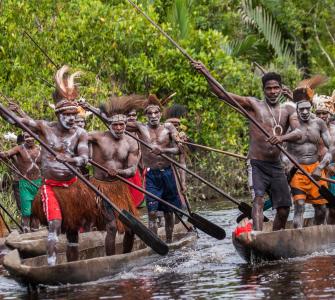The Asmat people in Asmat Regency have a rich cultural heritage which includes a unique social system and elaborate wood carvings that communicate stories about beliefs, history, and natural resources. Much of this culture relies on their close relationship and understanding of their environment. This close relationship to the natural environment is both an asset to Indigenous Peoples and a threat: many are extremely dependent on natural resources and are threatened by changes to them. Natural resource management and economic development are some of the key challenges facing Asmat Regency and are often assumed to be in opposition to each other.
Within Indonesia, the economic and development value contributed by Indigenous People is too-often undervalued by policy-makers. This framing positions Indigenous People in opposition to development and allows policy-makers to see large-scale corporate investments as the only pathway to economic development in the region.
Economic valuation of ecosystem services can be a useful tool to recognize, demonstrate, and safeguard the rights of the Asmat indigenous community to autonomy over the natural resources they have been depending on for centuries. Through CSF’s inclusive and participatory approach, this economic valuation project not only educates the community about the economic significance of their natural resources but also can play a role in guiding policies and development that are in line with their local wisdom and aspirations. Respecting and understanding the context and the complexity of the economic and cultural values of the Asmat community is a crucial foundation for conducting meaningful and effective economic development.
In 2023, Conservation Strategy Fund (CSF) Indonesia together with WWF Indonesia, Musamus University, Asmat Indigenous People Association, and Alfons Suada Foundation conducted an in-person assessment of the traditional economy of four Asmat villages and put a value to their daily management of natural resources and their cultural practices. In each village, informal and formal discussions were held to obtain an overview of the economic model in the village. As part of this study, CSF held a training on economic valuation for lecturers from the Faculty of Agriculture and the Faculty of Economics and Business at Musamus University, as well as representatives of the Asmat Indigenous community.
Results
The study found that the value of direct benefits from natural resource products such as sago, river products, and timber ranged from 4.3billion IDR to 16.6billion IDR per year. Indirect benefits ranged from 234.9 million IDR to 2.6 billion IDR per year.
Taken as a whole, the economic value of the villages is competitive and highlights the value of natural resources for Indigenous Peoples. These figures are best understood in the context of mainstream economic indicators such as gross regional domestic product and regional minimum wage. The monthly household economic value of direct use products in each of the villages is above the local monthly minimum wage (3.52 million IDR/month). This suggests that the economic value of the environment’s direct use places communities in a position to fulfill their daily needs at a level that exceeds that of minimum-wage labor.
CSF Indonesia made several recommendations based on these findings. These valuations suggest that the Indonesian and regional governments should place greater attention on aligning their policies and plans with Indigenous Peoples. Physical infrastructure is much needed. Care must be taken to balance increased connectivity with resulting pressure on natural resources.
At the regional level, CSF Indonesia recommends that Indigenous Peoples such as the Asmat community are included in the District Work Plan (RKP) and APBD. For this inclusion to be effective, Indigenous Peoples must be offered legal recognition, protection and promotion.
Community capacity to manage natural resources must also be strengthened. This includes increasing Indigenous Peoples’ awareness of the value of these resources and their relationship to them. When development interventions are presented to Indigenous Peoples, capacity-building ensures that they have an appropriate sense of their sovereignty and bargaining position. Economic valuations are important proxies for the wealth and assets Indigenous Peoples offer in their management of the environment.
Read more about this initiative here.
__
This study is funded by WWF Indonesia in collaboration with YASA, LMAA, and Lecturers at the Faculty of Agriculture, Musamus University.
__
Photo: Asmat community, South Papua Province
Photo credit: Shutterstock.com

